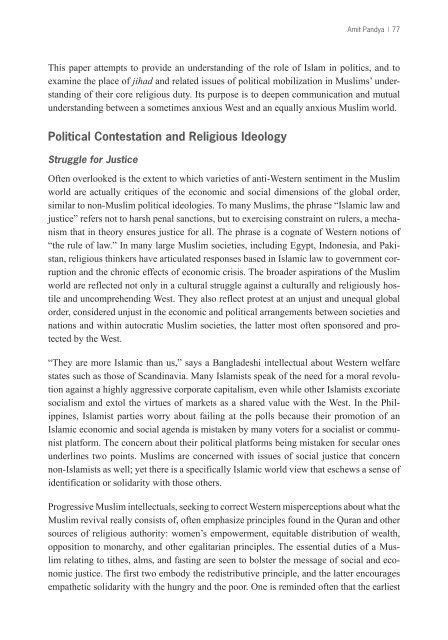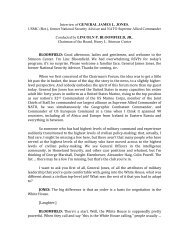Islam and Politics - The Stimson Center
Islam and Politics - The Stimson Center
Islam and Politics - The Stimson Center
You also want an ePaper? Increase the reach of your titles
YUMPU automatically turns print PDFs into web optimized ePapers that Google loves.
Amit P<strong>and</strong>ya | 77<br />
This paper attempts to provide an underst<strong>and</strong>ing of the role of <strong>Islam</strong> in politics, <strong>and</strong> to<br />
examine the place of jihad <strong>and</strong> related issues of political mobilization in Muslims’ underst<strong>and</strong>ing<br />
of their core religious duty. Its purpose is to deepen communication <strong>and</strong> mutual<br />
underst<strong>and</strong>ing between a sometimes anxious West <strong>and</strong> an equally anxious Muslim world.<br />
Political Contestation <strong>and</strong> Religious Ideology<br />
Struggle for Justice<br />
Often overlooked is the extent to which varieties of anti-Western sentiment in the Muslim<br />
world are actually critiques of the economic <strong>and</strong> social dimensions of the global order,<br />
similar to non-Muslim political ideologies. To many Muslims, the phrase “<strong>Islam</strong>ic law <strong>and</strong><br />
justice” refers not to harsh penal sanctions, but to exercising constraint on rulers, a mechanism<br />
that in theory ensures justice for all. <strong>The</strong> phrase is a cognate of Western notions of<br />
“the rule of law.” In many large Muslim societies, including Egypt, Indonesia, <strong>and</strong> Pakistan,<br />
religious thinkers have articulated responses based in <strong>Islam</strong>ic law to government corruption<br />
<strong>and</strong> the chronic effects of economic crisis. <strong>The</strong> broader aspirations of the Muslim<br />
world are reflected not only in a cultural struggle against a culturally <strong>and</strong> religiously hostile<br />
<strong>and</strong> uncomprehending West. <strong>The</strong>y also reflect protest at an unjust <strong>and</strong> unequal global<br />
order, considered unjust in the economic <strong>and</strong> political arrangements between societies <strong>and</strong><br />
nations <strong>and</strong> within autocratic Muslim societies, the latter most often sponsored <strong>and</strong> protected<br />
by the West.<br />
“<strong>The</strong>y are more <strong>Islam</strong>ic than us,” says a Bangladeshi intellectual about Western welfare<br />
states such as those of Sc<strong>and</strong>inavia. Many <strong>Islam</strong>ists speak of the need for a moral revolution<br />
against a highly aggressive corporate capitalism, even while other <strong>Islam</strong>ists excoriate<br />
socialism <strong>and</strong> extol the virtues of markets as a shared value with the West. In the Philippines,<br />
<strong>Islam</strong>ist parties worry about failing at the polls because their promotion of an<br />
<strong>Islam</strong>ic economic <strong>and</strong> social agenda is mistaken by many voters for a socialist or communist<br />
platform. <strong>The</strong> concern about their political platforms being mistaken for secular ones<br />
underlines two points. Muslims are concerned with issues of social justice that concern<br />
non-<strong>Islam</strong>ists as well; yet there is a specifically <strong>Islam</strong>ic world view that eschews a sense of<br />
identification or solidarity with those others.<br />
Progressive Muslim intellectuals, seeking to correct Western misperceptions about what the<br />
Muslim revival really consists of, often emphasize principles found in the Quran <strong>and</strong> other<br />
sources of religious authority: women’s empowerment, equitable distribution of wealth,<br />
opposition to monarchy, <strong>and</strong> other egalitarian principles. <strong>The</strong> essential duties of a Muslim<br />
relating to tithes, alms, <strong>and</strong> fasting are seen to bolster the message of social <strong>and</strong> economic<br />
justice. <strong>The</strong> first two embody the redistributive principle, <strong>and</strong> the latter encourages<br />
empathetic solidarity with the hungry <strong>and</strong> the poor. One is reminded often that the earliest

















